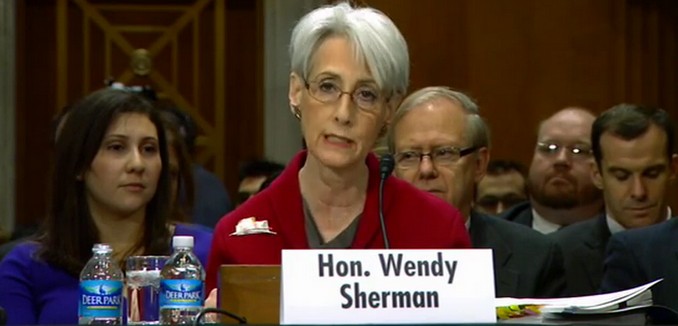Testimony given yesterday to the Senate Committee on Foreign Relations seems likely to deepen debates over the robustness of the Obama administration’s approach to Iran, many of which have become proxies for more narrow debates over the degree to which Congress should have a voice in approving any comprehensive deal with Iran.
Analysts, lawmakers, and journalists have for months focused on the terms of the interim Joint Plan of Action (JPA). Scrutiny continued yesterday, with undersecretaries from the Treasury and State Departments – David Cohen [PDF] and Wendy Sherman [PDF], respectively – scrambling to assure lawmakers that the international sanctions regime against Iran is holding. The administration has staked its credibility on the notion that the limited financial relief provided by the JPA would not trigger further erosions in the regime. Critics had immediately worried that a feeding frenzy would take hold, with countries and companies scrambling to avoid getting left behind as Iran’s markets reopened, only to be met with derision by White House-linked analysts and surrogates.
Empirical evidence that is unkind to the White House’s position has been piling up with increasing tempo since the JPA was implemented last month. Sherman and Cohen sought to convince lawmakers that the White House was committed to enforcing remaining sanctions and halting an increasingly undeniable rush back into Iran.
Mark Dubowitz, executive director of the Foundation for Defense of Democracies, provided skeptical testimony [PDF] on the point:
The U.S. Congress and President Obama closed this “golden loophole” in January 2013. At the time, the Obama administration could have taken action against Halkbank, which processed these sanctions-busting transactions, using the sanctions already in place to cut the bank off from the U.S. financial system. Instead, the administration lobbied Congress to make sure the legislation that closed this loophole did not take effect for six months—effectively ensuring that the gold transactions continued apace until July 1. That helped Iran accrue billions of dollars more in gold, further undermining the sanctions regime.
The implementation of the JPA and the impending start of comprehensive negotiations has also focused attention on discussions over Congress’s role in negotiations. Americans overwhelmingly favor extensive Congressional oversight of the Obama administration’s nuclear talks with Iran.
David Albright, the head of the non-partisan Institute for Science and International Security (ISIS) gave the committee [PDF] an overview of what a final deal would have to accomplish in order to verifiably put Iran’s nuclear program beyond use for weaponization. Last month ISIS published an extensive analysis, reportedly written after close consultations with U.S. officials tasked with the Iran portfolio, outlining the requirements. The ISIS report indicates that Iran would minimally have to remove 15,000 centrifuges, shut down its uranium enriching underground military bunker at Fordow, downgrade the reactor at its plutonium-production facility at Arak, and agree to a 20-year inspection regime what a successful agreement would have to include.
Albright also called attention to Iranian advances – which the regime is permitted to continue pursuing during the JPA – in developing next-generation centrifuges. Continued Iranian development of its advanced IR-2m centrifuges, Albright implied, would provide it with a stockpile that would swamp the temporary freezes mandated by the JPA. Since the centrifuges are more effective, and therefore fewer are needed, analysts fear that Iran could keep them beyond the reach of inspectors.
The upshot, Albright and others emphasized, is that under some scenarios the JPA’s six-month window would position Iran to rush toward a bomb should it choose to. Allowing Iran to extend the agreement for another six months would aggravate such concerns.
[Photo: U.S. Department of State / YouTube]




